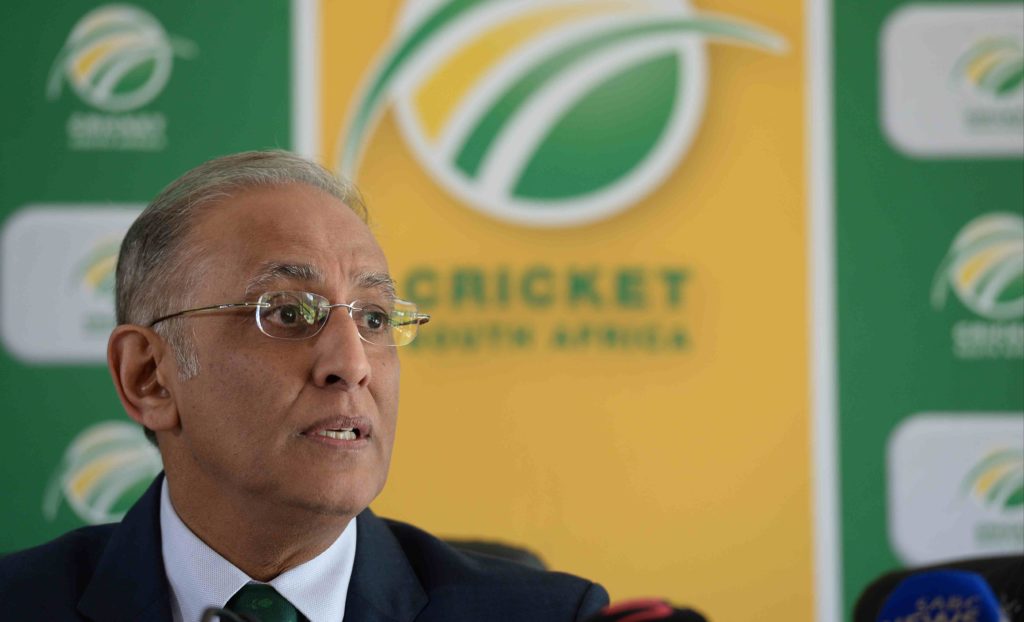Haroon Lorgat comes with the weight of a near-impeccable record in cricket administration, but this will be his greatest challenge yet, writes RYAN VREDE.
In selecting Lorgat to lead a new Cricket South Africa interim board in the wake of the damage the previous regime either actively participated in or passively accepted, sports minister Nathi Mthethwa has made the pragmatic but powerful appointment.
Lorgat faces a challenge so immense it would crush most. CSA is in deep financial, commercial and reputational distress, the likes of which it hasn’t been in since readmission to international cricket post apartheid. In the cause-and-effect transaction, its affiliates are hurting too, which in turn has plunged cricket at all levels into chaos. That all of this has happened in the middle of a pandemic compounds matters.
Lorgat’s team is comprised of Omphile Ramela (president of the South African Cricketers’ Association), Andre Odendaal (former CEO of Western Province Cricket), Judge Zak Yacoob (former justice of the Constitutional Court), Starvos Nicolau (senior executive in the pharmaceutical industry), Judith February (lawyer and governance specialist), Andile Dawn Mbatha (chief financial officer of the Independent Electoral Committee), Nkeko Caroline Mampuru (deputy head of the special investigation unit – a forensic investigation and litigation agency) and Xolani Vonya (former head of Eastern Province Cricket).
On the surface, it appears the interim board covers most of the critical bases for this rebuilding job. Personally, I’m comforted by the fact that the majority of the interim board were drawn from outside the pool of full-time cricket administrators. An independent eye and fresh perspective are needed to correct the wrongs of the past. However, critically, in Lorgat they have a leader who has survived the snake pit that is South African cricket administration and come out the other end battle hardened.
According to Mthethwa, the interim board has around three months to complete their mandate of ‘stabilising cricket’. This is an unforgiving time frame, considering just how broken CSA is, as well as the role Covid-19 restrictions will play in their day-to-day functioning. I don’t envy Lorgat and co, but that doesn’t mean I don’t have high expectations, and neither should the South African cricket fraternity.
Lorgat’s elevation to the hot seat should calm fears about the future of South African cricket, though. This is a man who, in his capacity as International Cricket Council chief executive, was faced with navigating the immense challenge of terrorism’s threat to cricket in Pakistan, an uprising in spot-fixing in the game and declining interest in Test cricket. His solution for the diminishing appetite for Test cricket in 2013 was to propose a World Test Championship. Broadcasters killed the plan in its infancy because it wasn’t financially lucrative enough. However, today that WTC is in place, thanks in no small part to Lorgat’s catalytic influence.
Upon his departure from the ICC in 2012, Alan Isaac, the then ICC vice-president and the man who managed the search for Lorgat’s successor, said: ‘From a personal point of view, I am extremely disappointed that I will not be able to work with Haroon during my term as ICC president. He has been exemplary in the way he has led the organisation and deserves credit for his ethical leadership of the ICC.’
Lorgat walked away from CSA in 2017 due to differences with a board that was in the early stage of its rot. At the time, it was reported that Lorgat, who was meant to stay until 2019, fundamentally disagreed with the CSA board in the handling of the upcoming T20 Global League. CSA put out a media statement that claimed the parties had mutually agreed to part ways, but it was widely known that Lorgat had become tired by the amateurish administration that was taking root at the organisation.
Thabang Moroe replaced him in an acting capacity and, despite the Fundudzi report revealing he did not meet the job requirements, later became the permanent CEO of CSA. The rest is a black mark on South African cricket’s history.
I hope Lorgat is left alone to do his work. It is the people’s work, because cricket belongs to the people. In reality, Lorgat’s mandate transcends ‘stabilising’ the game. He is mandated to return the game to it’s rightful owners – the people.







